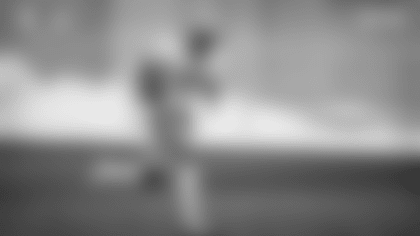Merlyn "Bud" Lea, the beat reporter for the Milwaukee Sentinel when the Green Bay Packers won the first two Super Bowls, died Wednesday morning, Jan. 20.
Lea, 92, died of natural causes. He was sick with COVID in November, but had recovered and was residing at an assisted living facility in Mequon before being recently hospitalized.
A native of Green Bay, Lea was hired by the Sentinel in 1953 and covered his first Packers games that season. He was named the Sentinel's regular beat reporter a year later and covered the Packers in that capacity for 19 seasons. He subsequently covered them as the Sentinel's sports editor and columnist prior to his retirement in 1995. Thereafter, Lea continued to write columns about the team for Packer Plus, a weekly magazine published by the Milwaukee Journal Sentinel.
Highly respected by colleagues and the Packers officials he covered from Vince Lombardi to Bob Harlan and others in between, Lea was known for his thorough, objective and aggressive coverage of the team.
In fact, the Green Bay Packers Hall of Fame adopted an award in his name last year. Along with being the namesake, he was scheduled to be the first recipient of the "Bud Lea Media Award." While the 2020 Hall of Fame banquet was postponed due to the COVID pandemic, the award was established with the intent of presenting it annually.
Lea also authored "Magnificent Seven: The Championship Games That Built the Lombardi Dynasty," which was published in 2002. Lea covered all nine of Vince Lombardi's teams, including the five that won NFL championships in the 1960s.
At the national level, Lea covered 30 Super Bowls.
"Packers fans were fortunate to have Bud Lea as a reporter for so many years," Packers president Mark Murphy said. "I had the privilege of getting to know Bud when I started with the organization and immediately had great respect for him. He was a throwback to the great journalists of previous years. He was critical when it was called for, but always fair. I enjoyed his personality and loved his stories of covering the team over the years.
"The Packers share our condolences with his family and friends. Wisconsin sports fans have lost a legend."
When Murphy became Packers president in 2008, Lea was in his 80s and still writing his columns for Packer Plus.
Harlan, the former Packers president, briefly worked as a reporter in Milwaukee for United Press International, starting in 1959, and then became sports information director at Marquette University until 1966. Thus, he knew Lea in both capacities and also was one of his devoted readers for almost eight years.
"He was just a fun guy to be with," Harlan said Wednesday upon learning of Lea's death. "I loved being around the guy. I considered him a friend. He just really had a love for the franchise down deep. He was a very fair reporter, but he wasn't easy."
Once Harlan joined the Packers in 1971 as assistant general manager and through his presidency, he dealt with Lea more frequently into the 1990s.
"He was a very good reporter. He was a professional," said Harlan. "He was a true legend. I'm delighted the Packers Hall of Fame is going to have an award in his name. He was the epitome of what a sportswriter should be. It shows the respect everybody had for him."
Growing up on Green Bay's West Side, Lea started following the team in the early 1930s, attending games at old City Stadium.
"When I was six years old, my dad worked in the railroad mail service, the post office car on trains from Green Bay to Winona, Minn.," Lea said in a 2010 interview. "He could afford only one ticket to go to a Packer game. He was a big sports fan. He'd take me there and I remember going through the turnstiles. My dad was kind of a skinny guy and the guy at the turnstile would say, 'Double up,' and two skinny guys would get in on one admission ticket. You'd sit on those wooden bleachers. You always took a blanket because they had so many splinters in them."
Lea's most memorable years as a writer were covering Lombardi's teams.
"I was always on edge with the guy," said Lea. "I remember the day he came into Green Bay. (Team president Dominic) Olejniczak met him at Austin Straubel (Field) and they brought him down to the Northland Hotel. They had a news conference there. A radio guy and I asked Vince if we could come up to his room and just talk to him. (Lombardi) was with his wife and said, 'Come on up.' We went up to his room and they ordered room service, and he seemed like a really nice guy. We said, 'Boy, this is great.' Little did I know things were going to change fast."
While Lombardi religiously read Lea's coverage before starting his work day, he never made it easy on him at a time when the Milwaukee writers often had to interview the coach by telephone.
"It was terrible," said Lea. "One time I couldn't get back from Baltimore after a game. I listed all my questions and called him from the airport. The first thing he says is, 'OK, let's get this over with.' I ask the first question, the answer is, 'Nope.' The second answer, 'I don't know about that.' The third question, he asks, 'How many more you have?' I said, 'I'm just getting started.' 'I don't have time for this.' I just dreaded those calls by telephone.
"There was nobody like Lombardi of all the guys I covered in sports. I'm glad I had that experience. I respected him, but, yeah, I did fear him. I respected him an awful, awful lot. Really. When he spoke, he made such great sense. He didn't dangle around with words. I don't think he treated me any better. I think he respected me. He never complained about anything. I remember one time I had a couple Scotches, probably one too many at his 5 o'clock club. I told him point blank, 'Hey, coach, I'll put up with this stuff.' He said, 'What?' I said, 'Don't lose.' He said, 'Mister, I don't intend to lose.'"
Services for Lea are pending.















